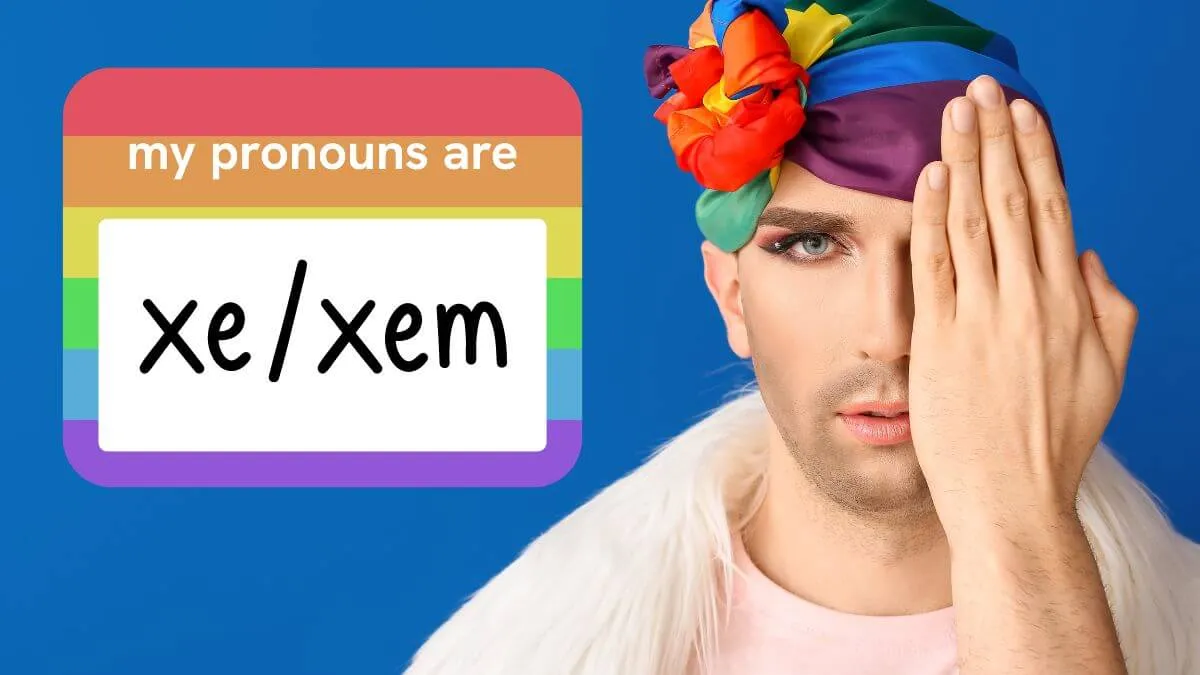Table of Contents
Darryl Betts
Darryl is a businessman and a post-graduate student in Philosophy at the University of Auckland, with particular interests in the philosophy of science, philosophy of mind, epistemology, logic, and AI. He holds a BSc in Computer Science and a BA in Philosophy, Logic and Computation.
The concept of “preferred pronouns” (or more recently “neo-pronouns”) has come into being – and a section of society is eager to tell us their preferred pronouns and to punish those who refuse or question the legitimacy of the concept. But the topic of gender identity is so heated that seldom do those on either side of the argument take the time to question the practical side of the idea of people dictating the pronouns by which others should refer to them.
My primary concern here is with language and communication. Here I am going to ask how we as speakers (or writers) choose between the words “he” and “she”, because I think this really clinches the debate. The words “he” and “she” (as well as “her” and “him”) have a very long-established and specific role in communication. They are third-person pronouns, and according to my Oxford English Dictionary a pronoun is “used instead of (other or proper) noun to designate (without naming)”. Children learn how to use words like “he” and “she” at a very young age, and these words are so common and so deeply ingrained that for most people it is very difficult to avoid using them – even those who try to promote alternatives.
The whole purpose of language is to enable us to communicate effectively with other people. If we deviate too far from the rules of the language and the commonly understood meaning of words, then communication breaks down. Of course, we deal with minor breakdowns all the time, but if the deviations become too severe or too frequent then communication becomes difficult or even impossible. There is a hilarious sequence in the movie The Dictator where the title character has supposedly changed the dictionary to replace the words “positive” and “negative” with a single word “alideen”.
So here is the crucial question. When we are speaking about a person, how do we decide whether to use the word “he” or “she”? This is a key question which I think is often overlooked within the heated debate about gender and identity.
I think there are three possible answers to this question. The first possibility is that our choice is made based on whether the person appears to be a man or woman. The second possibility is that our choice is made based on whether we believe the other person to be a man or woman. The third possibility is that our choice is based on whether the other person believes themselves to be a man or woman.
While mere appearance plays an important role in our decision, there seems to be a point where we find ourselves making a deeper judgement. Consider the following example.
Suppose someone dresses up a tree to look like a woman. Now suppose that from a distance you are convinced you are looking at a woman. Consequently, you might use the term “she” to refer to what you are looking at. That would be perfectly understandable.
But now you move closer, and you come to realize that you are actually looking at a tree dressed up as a woman.
Will you continue to refer to the tree as “she”? No. As soon as you realize that you are looking at a tree you will almost certainly from that point on refer to the tree as “it”, and if someone asks you why you previously said “she” you will say that you mistakenly believed the tree to be a woman.
Even the words we use when we talk about this give us away – you mistakenly believed the tree to be a woman.
Our instinct is easily explained. Deciding whether another person is male or female is one of the most deeply ingrained animal behaviours we have – it’s right up there with finding food and reacting to threats. It’s a skill many millions of years in the making and we are so good at it that most of the time we give it no conscious thought.
I think that we should conclude from this that our innate judgement about whether the person is male or female plays the major role in our pronoun selection. That’s not to say that there aren’t times when we can override or disregard that deeper instinct – even if only temporarily, and of course we can probably all remember occasional times when we weren’t sure and as a result either made a provisional judgement or withheld judgement altogether.
But let’s now consider the third possibility that I suggested, which is that we choose between pronouns based on whether the other person believes themselves to be male or female.
The first problem with this idea is that this is not how the third person pronoun role works. The definition of a third person pronoun is to designate without naming. In contrast, when you refer to someone using a word of that particular person’s choosing, you are in effect using a name. Of course, people have a right to choose their own names – but that isn’t the issue here. Since the role of a pronoun is to designate without naming, insisting that people use what is in effect a name, to designate without naming, is non-sensical – to say the least.
There are also a number of significant practical problems that would arise if pronoun selection were decided by the other person – even more so if it is that other person’s inner beliefs which drive that decision.
The most obvious problem – which people do frequently point out – is that third person pronouns are often used when the person is not present. But even if the other person is present, our knowledge of what they believe themselves to be is limited. If we needed to know what the person believes themselves to be before we could choose between “he” and “she”, then we would almost never be able to use those words – especially if there is a risk of social punishment (or worse) for making what they or someone else considers to be the wrong choice.
Or consider how we refer to pets. We happily call them “she” or “he” – but we have no easy way to determine their beliefs about themselves.
We also have the significant problem that a person may have false beliefs about themselves. If your name is Fred but you falsely believe yourself to be Napoleon, should I be obliged to call you Napoleon? Of course, there might be special cases where someone very close to you does so out of compassion – but as a rule we don’t make a practice of indulging the delusions of the people around us.
Or consider my earlier tree example. Suppose there is scientific evidence that trees can think and have beliefs about themselves. If you become aware that the tree believes itself to be a woman, will you start referring to the tree as “her”?
All of these problems and more represent a cost problem. There is a cost associated with remembering things about other people, and as a general rule we bear the cost only so far as there is benefit. We know a lot about those close to us, but there are a larger number of people we know by name and little else. People will not accept additional cost without clear benefit. When people declare their preferred pronouns in public or on social media, some people in the audience may retain that information, but most people simply will not.
Practical problems such as these do matter. We would expect language practices which carry a high cost relative to benefit to fall into disuse, and eventually to be selected out of the language – or in this case, not be widely adopted. In spite of this, a minority today are trying to make it so that there is a greater social cost on not remembering the preferred pronouns of another person. It would be unwise to say they won’t win, but the practical problems I have outlined are substantial.
To summarize so far, I have argued here that we choose gender-specific pronouns based on whether we judge the other person to be a man or woman. Multiple factors contribute to that judgment, not least of which is appearance. But crucially, that judgement isn’t based on the beliefs that the other person has about themselves – nor would it be practical to do so.
Unfortunately, all this creates quite a big problem for a person who has a self-belief which is not consistent with the manner in which others might refer to them.
Some people argue that this is about consideration for others, and when it involves people close to us this could be persuasive. But that is no answer to the many significant problems I outlined earlier. If you think I am fat, then out of consideration for my feelings you would probably refrain from referring to me as “fatty”. But you can do that easily because the word “fatty” does not play a foundational role in the language. Expecting you (and everyone else) to use particular pronouns to accommodate my feelings is a very different proposition.
One possible way to address the issue would be for us all to stop using gendered pronouns in favour of gender-neutral pronouns such as “it” or “they”. But this would result in a significant loss of utility, for example, “he” or “she” sometimes make it clear which of a number of possible people are being picked out. Another obvious problem is that the word “they” already has a primary role as a plural form. On top of these problems, removing such common words from use creates a major practical problem given that we have a vast quantity of written material already in existence, not to mention a large number of people for whom conventional pronoun use is deeply ingrained. Also, the ability to freely choose what one says is a crucial aspect of a free society, and we should be very cautious about moves to increase control over speech.
But even if it was possible somehow to ban the use of “he” and “she” – it is likely that people will simply find another way of saying what they want to say – and then we are back at square one. Jeff Goldblum in the movie Jurassic Park famously said “life finds a way” – and I think we could say something similar about language. We can try to force changes, but ultimately language evolution will follow a course which people find easiest and most effective.
It is conceivable that, over time, people might shift toward appearance as the basis for selecting between “he” or “she”. Although this practice would seem strange to me, children might grow up accustomed to using “he” for people who appear to be men and “she” for people who appear to be women. Maybe some people already do this.
Whether things go in this direction or not, the point I want to make here is that the selection of pronoun will still be firmly in the hands of the speaker. To the extent that the self-identified gender of a person is reflected in their appearance, then that person will be satisfied with the gendered pronouns which others use to refer to them. But going further than this and expecting others to use a specific pronoun of your choosing, simply will not work.









